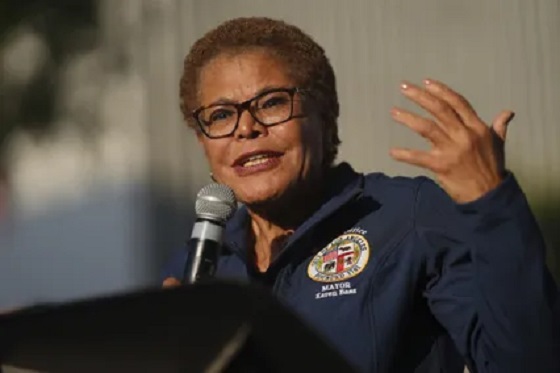DEI
Despite Billions In Backing, Studies Show Diversity Trainings Just Aren’t Working

 From the Daily Caller News Foundation
From the Daily Caller News Foundation
A number of corporations are beginning to retreat from their diversity initiatives, with American Airlines, BlackRock, JPMorgan Chase and Lowe’s all editing their DEI policies to be less racially focused following lawsuit threats from conservatives.
A wealth of research suggests that the billions of dollars corporate America, academia and government agencies have spent on diversity training have done little to impact people’s behavior.
What impact diversity trainings do have is often short-lived or purely influences beliefs without impacting actions, according to a review of multiple meta-analyses, a type of research that summarizes the results of hundreds of studies. American businesses alone spend roughly $8 billion a year on the same diversity trainings research suggests are ineffective, according to the Harvard Business Review.
On top of the billions corporations spend on diversity trainings, hundreds of millions of dollars worth of public funds flow to diversity, equity and inclusion (DEI) initiatives through state universities and the federal government.
A 2020 meta-analysis synthesized findings from 492 different studies and found that trainings designed to reduce implicit bias, a term used by academics to refer to discriminatory attitudes people hold but are not consciously aware of, “generally produced trivial changes in behavior.” Per the study, the trainings had “relatively weak” effects on measures of implicit bias, however, it also found that changes in implicit biases didn’t necessarily translate to behavioral changes.
Many nonprofits, like the National Equity Project, provide diversity training services to public and private clients like businesses.
“Nonprofit spending on the left, roughly defined, swamps the center-right by a factor of three or four to one depending on the year … and yet the country hasn’t really moved much,” Capital Research Center Senior Investigative Researcher Ken Braun told the Daily Caller News Foundation, speaking on diversity training spending. “The very fact that DEI was ever created demonstrates the abject failure of decades of spending and messaging on what we used to call ‘affirmative action.’”
Diversity trainings may influence the stated beliefs of participants, but cause little change in day-to-day behavior. A study conducted by a team of University of Pennsylvania researchers in 2019 surveyed 3,000 employees at a multi-national company and found that the impact of anti-sexism training led to employees acknowledging that women face discrimination, but not changing the way they behaved.
The apparent inefficacy of diversity training hasn’t stopped bureaucrats from spending public funds on it, with a number of school districts and public colleges paying Ibram X. Kendi, the academic famous for popularizing the idea of “anti-racism,” tens of thousands of dollars for presentations. Roughly two-thirds of American colleges in 2016 had diversity training for faculty, and 43% of those trainings were mandatory, according to a survey conducted by researchers Frank Dobbin of Harvard University and Alexandra Kalev of Tel-Aviv University.
President Joe Biden signed an executive order in June 2021 ordering federal agencies to increase their diversity programming, asserting that “such training programs should enable federal employees, managers and leaders to have knowledge of systemic and institutional racism and bias.”
Questions surrounding the effectiveness of diversity trainings have existed for some time, with a 2009 analysis of hundreds of studies published in the Annual Review of Psychology failing to find evidence that diversity trainings are effective at reducing prejudice or influencing behavior in the ways intended.
Despite academics struggling to find evidence to support the efficacy of diversity trainings, many corporations leaned into such initiatives after the consulting firm McKinsey and Company published a report in 2015 claiming that companies with more diverse executives saw higher profits, according to the Wall Street Journal. Multiple academics, however, failed to replicate the results of the consulting firm’s study.
Repeating the studies of others is a common practice used in academia to determine if a result is reflective of reality or if it was the product of poor methodology or dumb luck. Econ Journal Watch (EJW), a publication run by economics professors, was among those that attempted to recreate McKinsey’s findings only to discover no statistically significant link between executive diversity and profitability.
“Caution is warranted in relying on McKinsey’s findings to support the view that US publicly traded firms can deliver improved financial performance if they increase the racial/ethnic diversity of their executives,” EJW’s report reads. “We are unable to replicate the same statistically reliable association between firm financial performance and executive race/ethnic diversity as they report.”
A number of corporations are beginning to retreat from their diversity initiatives, with American Airlines, BlackRock, JPMorgan Chase and Lowe’s all editing their DEI policies to be less racially focused following lawsuit threats from conservatives.
Braun called the apparent movement of corporate America away from DEI initiatives “encouraging” but laughed when asked if academia and the federal government might follow suit.
Other studies have found that diversity trainings don’t only fail to alter people’s behavior but sometimes produce backlash effects that make people more prejudiced. Dobbin and Kalev, in a book they co-authored, found that after implementing diversity trainings, firms saw a decrease in women and minorities in leadership positions.
“If diversity training has no impact whatsoever, that would mean that perhaps billions of dollars are being wasted annually in the United States on these efforts,” journalist Jesse Singal wrote in 2023. “But there’s a darker possibility: Some diversity initiatives might actually worsen the DEI climates of the organizations that pay for them.”
Featured Image: Benjamin Child/Unsplash
Business
Canadian gov’t spending on DEI programs exceeds $1 billion since 2016

From LifeSiteNews
Some departments failed to provide clear descriptions of how the taxpayer funds were used. For example, Prairies Economic Development Canada spent $190.1 million on projects related to diversity, equity and inclusion ventures but could not provide details.
Federal diversity, equity and inclusion programs have cost Canadian taxpayers more than $1 billion since 2016.
According to information published September 18 by Blacklock’s Reporter, diversity, equity and inclusion (DEI) government grants have totaled $1.049 billion since 2016, including grants for “cultural vegetables.”
A $25 million grant, one of the largest individual grants, was given to the Canadian Gay and Lesbian Chamber of Commerce to “strengthen Canada’s entrepreneurship ecosystem to be more accessible to LGBTQ small businesses.”
The government payouts were distributed among 29 departments, ranging from military to agricultural projects.
The Department of Agriculture spent $90,649 for “harvesting, processing and storage of cultural vegetables to strengthen food security in equity-deserving Black communities” in Ontario.
Some departments failed to provide clear descriptions of how the taxpayer funds were used. For example, Prairies Economic Development Canada spent $190.1 million on projects related to diversity, equity and inclusion ventures but could not provide details.
“PrairiesCan conducted a search in our grants and contributions management system using the keywords ‘equity,’ ‘diversity’ and ‘inclusion,’” the Inquiry said. “Certain projects were included where diversity, equity and inclusion were referenced but may not be the main focus of the project.”
DEI projects are presented as efforts by organizations to promote fair treatment, representation, and access to opportunities for people from varied backgrounds. However, the projects are often little more than LGBT propaganda campaigns funded by the Liberal government.
As LifeSiteNews reported, the University of British Columbia Vancouver campus posted an opening for a research chair position that essentially barred non-homosexual white men from applying for the job.
Additionally, during his short time in office, Liberal Prime Minister Mark Carney has already shown Canadians that he is a staunch supporter of the LGBT agenda after he spent over $2 million in taxpayer funding on LGBT groups during his first week in office.
Canadians have repeatedly appealed to Liberals to end pro-LGBT DEI mandates, particularly within the education system.
As LifeSiteNews previously reported, in June 2024, 40 Canadian university professors appealed to the Liberal government to abandon DEI initiatives in universities, arguing they are both ineffective and harmful to Canadians.
Business
Cracker Barrel and the Power of Conservative Boycotts

The uproar over the restaurant chain’s rebrand might appear trivial, but it carries a deeper significance.
Last week, another viral culture war story captured the headlines. The old-timey restaurant chain Cracker Barrel had rebranded, removing the old man and the barrel from its logo, and replacing it with a simple, modernistic, typography-only design.
At first, I dismissed the story as trivial. I have never set foot in a Cracker Barrel and, as such, have little stake in what is emblazoned above its doorways. But after speaking with conservative activist Robby Starbuck, I learned there was something beyond the logo that deserved our attention. According to Starbuck, Cracker Barrel, whose customer base is heavily white, conservative, and rural, had spent the last few years adopting all the fashionable left-wing corporate policies: DEI, Pride, pronouns, race politics, and the rest.
The logo change might have caught the public’s initial attention, but the underlying political story had real stakes. If companies that depend on conservatives adopt radical left-wing policies, they must face the consequences.
And, thanks to the work of Starbuck and others, the social media uproar seems to have made a difference. As the story circulated through the media, the company’s stock price plummeted by as much as 17 percent. Cracker Barrel has quickly walked back its changes.
All this is salutary. Beginning with the revolt against Bud Light, the Right learned how to flex its muscles in the marketplace. Rather than defer to corporations as they did in the past, conservatives have realized that corporations have a culture and must be constantly reminded that, if they deviate from core American values, the consequences will be felt in their bottom line. Starbuck has had enormous success on this point, leading boycott campaigns that have changed policies at Harley-Davidson, Tractor Supply, John Deere, and other major brands.
A number of lessons can be drawn from this experience. First, conservatives can win these culture fights. Second, corporations follow the narrative in the media. Third, behavior changes through reward and punishment.
This last point is especially important. Some might dismiss the Cracker Barrel campaign as minor, or even embarrassing, given that the company is a decidedly down-class brand. But there is enormous value in making an example of the company and cementing a fear that conservatives can spontaneously lash out at any institution that crosses the line. Today, it’s Cracker Barrel; tomorrow it might be Pepsi, Target, or Procter & Gamble. As we have seen in recent years, corporate CEOs are highly sensitive to shifts in public opinion—and marginal changes in revenues—and will drop left-wing policies as soon as they become a liability.
The question is how to gain leverage. We are all tempted to be polite in public. But the fight over corporate culture can’t be won without securing real, tangible victories—which means real, tangible losses for institutions on the other side. Even if we don’t care about Cracker Barrel in particular, we should all care about the ideological capture of American institutions and use whatever power we have to reverse it.
And for that to occur, the Barrel must be broken.
Subscribe to Christopher F. Rufo.
For the full experience, upgrade your subscription.
-

 National2 days ago
National2 days agoDemocracy Watch Renews Push for Independent Prosecutor in SNC-Lavalin Case
-

 Alberta2 days ago
Alberta2 days agoClick here to help choose Alberta’s new licence plate design
-

 International1 day ago
International1 day agoHamas will disarm or die
-

 illegal immigration1 day ago
illegal immigration1 day agoLos Angeles declares a state of emergency over ICE deportations
-

 International2 days ago
International2 days agoDaughter convinces healthy father to die in double assisted suicide with mother
-

 International1 day ago
International1 day agoUS Warns Hamas To Halt Executions
-

 Business1 day ago
Business1 day ago‘Taxation Without Representation’: Trump Admin Battles UN Over Global Carbon Tax
-

 Indigenous1 day ago
Indigenous1 day agoConstitutional lawyer calls for ‘false’ claims to end in Canadian residential schools burials







